The gau rakshak stated that the famine-stricken people were suffering because of their past karma and nothing could be done for them.
The reply apparently infuriated Vivekananda, who told the gau rakshak bluntly that he had no sympathy to spare for societies which would not lift a finger to help human beings but wasted piles of food on birds and beasts.
A fascinating excerpt from Govind Krishnan V's book, Vivekananda The Philosopher of Freedom.
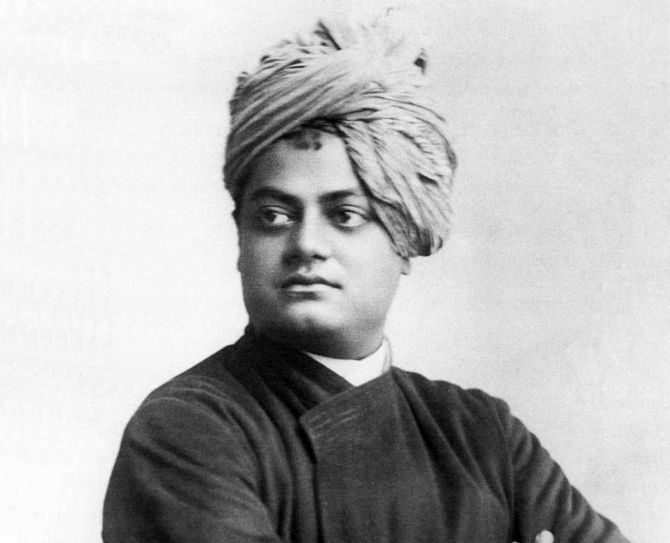
Two weeks after his arrival in Calcutta, Vivekananda had his only recorded encounter with a member of a cow protection committee, a man who, in a sense, was the ancestor of modern day gaurakshaks or cow vigilantes.
Their conversation was taken down by Vivekananda's disciple Sharat Chandra Chakravarty, and gives us valuable insight into what Vivekananda thought of cow protection and its positioning with regard to Hinduism.
Sharat Chandra, who describes the member of the gaurakshak sabha as an 'enthusiastic preacher', narrates the following conversation, which can be found in the sixth volume of The Complete Works of Swami Vivekananda.
At the announcement of this preacher of cow-protection Swamiji came out to the parlour room.
The preacher saluted Swamiji and presented him with a picture of the mother-cow.
Swamiji took that in his hand and, making it over to one standing by, commenced the following conversation with the preacher:
Vivekananda: What is the object of your society?
Gau rakshak: We protect the mother-cows of our country from the hands of the butcher. Cow-infirmaries have been founded in some places where the diseased, decrepit mother-cows or those bought from the butchers are provided for.
Vivekananda: That is very good indeed. What is the source of your income?
Gau rakshak: The work of the society is carried on only by gifts kindly made by great men like you.
Vivekananda: What amount of money have you now laid by?
Gau rakshak: The Marwari traders' community are the special supporters of this work. They have given a big amount for this good cause.
Vivekananda: A terrible famine has now broken out in Central India. The Indian Government has published a death-roll of nine lakhs of starved people. Has your society done anything to render help in this time of famine?
Gau rakshak: We do not help during famine or other distresses. This society has been established only for the protection of mother-cows.
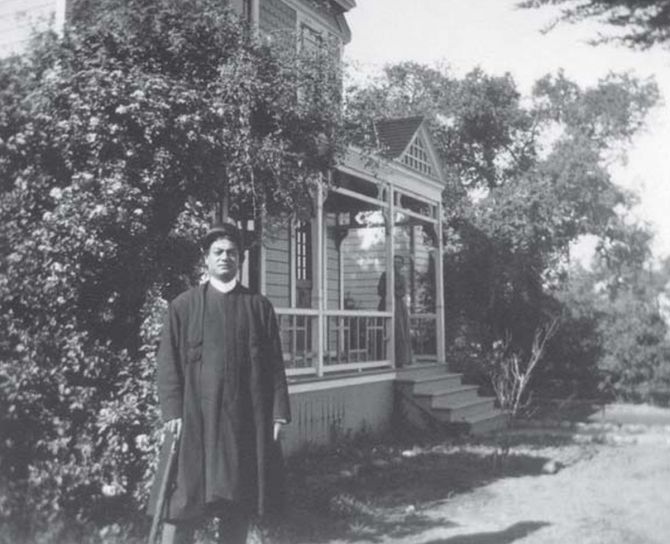
The preacher was unmoved by Vivekananda's exhortation that it was his duty to help his fellow brothers and sisters who were facing death.
He replied, apparently without any sense of irony, that the famine-stricken people were suffering because of their past karma and nothing could be done for them.
The reply apparently infuriated Vivekananda, who told the gau rakshak bluntly that he had no sympathy to spare for societies which would not lift a finger to help human beings but wasted piles of food on birds and beasts.
Vivekananda further countered that if one were to appeal to the principle of karma, then the cows were falling into the butcher's hand because of their own karma, and it was useless to do anything for them.
This retort flummoxed the preacher. 'Yes, what you say is true, but the Shastras say that the cow is our mother.'
Vivekananda's reply sums up his thoughts. 'Yes, that the cow is our mother, I understand: who else could give birth to such accomplished children?'
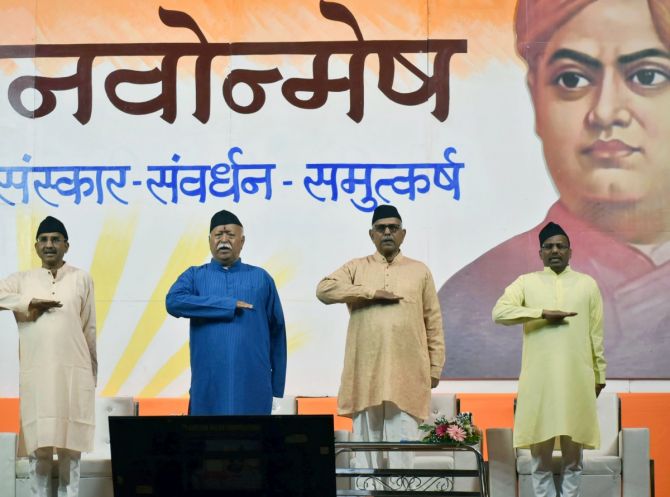
The RSS and the Sangh Parivar claim Vivekananda as an inspiration; Vivekananda is most important in the Sangh's pantheon of cultural figures.
However, Vivekananda had no influence on the RSS in its formative years when it developed its political ideology of Hindutva, or in the years immediately following Independence.
The Sangh's public adulation of Vivekananda seems to have begun in the sixties.
He was presented as both a patriot and a glorifier of Indian culture and Hinduism.
The Sangh tried to create greater recognition for a more Hinduized, nationalistic Vivekananda.
A watershed was the movement led by the RSS and the VHP to install a Vivekananda memorial in Kanyakumari.
The Tamil Nadu government was not keen, so the RSS was able to build a movement out of the Vivekananda memorial, making it into a national cause.
They distributed lakhs of leaflets with quotations from Vivekananda, in the process impressing on people's minds an association between Vivekananda and the Sangh.
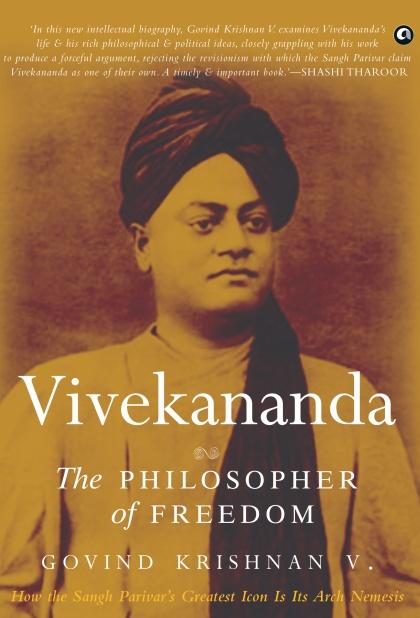
Having garnered support from across India, the RSS eventually got the memorial as well as a Vivekananda Kendra built.
This allowed the RSS and its Sangh affiliates to forge an association in the popular mind between them and the figure of Vivekananda, giving the RSS's claim of representing Hinduism legitimacy. Vivekananda was already part of the national consciousness in the sixties.
With their tireless efforts to further iconize his image, the Sangh not only took credit for doing something for Hinduism, but also gained the legitimacy of association with one of modern Hinduism's most revered and admired figures.
Today, Vivekananda's pictures adorn numerous RSS public meetings; usually the iconic picture of the sanyasi in flowing orange robes and turban, standing with his hands crossed and head held high.
The RSS organises regular commemorative events, conferences, meetings, and symposiums on Vivekananda.
Embedding Vivekananda in the public narrative of Hindutva has allowed the Sangh to create the impression that Vivekananda, the man and the thinker, is an ideological predecessor and an ally.
This perception has been reinforced by the lack of powerful counter narratives which challenge the Sangh's appropriation and by the deification of Vivekananda in popular consciousness.
Vivekananda's thoughts and ideas are rarely discussed, even by those who valorize him.
Even in academia, there have been very few critical discussions of his key texts, philosophical ideas, and ideological leanings.
This ensures that Vivekananda remains just an emblem that admirers across the political spectrum pay homage to.
This lack of a critical discourse around Vivekananda has allowed the Sangh to create the impression of a kinship between Vivekananda's thought and their own Hindutva ideology, merely by juxtaposing Vivekananda's persona with its cultural and religious activities.
Excerpt from Vivekananda The Philosopher of Freedom by Govind Krishnan V has been used with the kind permission of the publishers, Aleph Book Company.
Feature Presentation: Rajesh Alva/Rediff.com







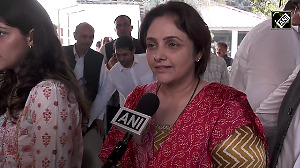


 © 2025
© 2025